Unit 4 Stage and screen Using language课件(共37页PPT)-高中英语外研版(2019)必修第二册
文档属性
| 名称 | Unit 4 Stage and screen Using language课件(共37页PPT)-高中英语外研版(2019)必修第二册 | 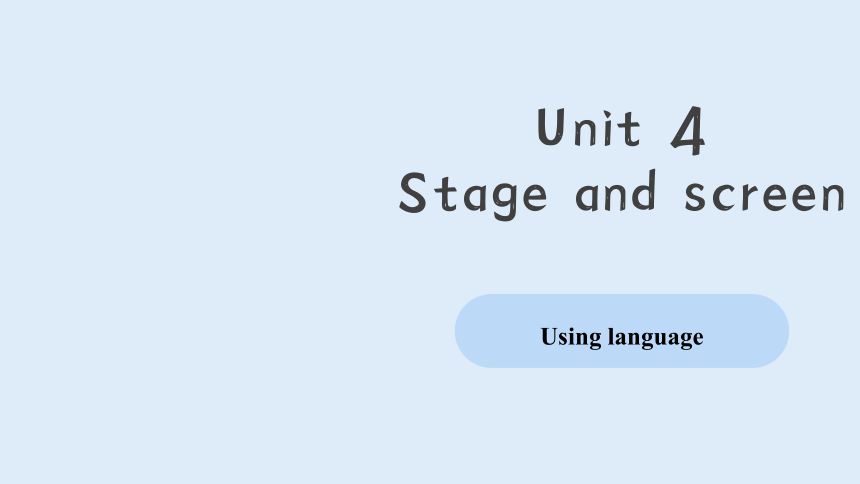 | |
| 格式 | pptx | ||
| 文件大小 | 57.0MB | ||
| 资源类型 | 教案 | ||
| 版本资源 | 外研版(2019) | ||
| 科目 | 英语 | ||
| 更新时间 | 2025-08-01 10:57:05 | ||
图片预览

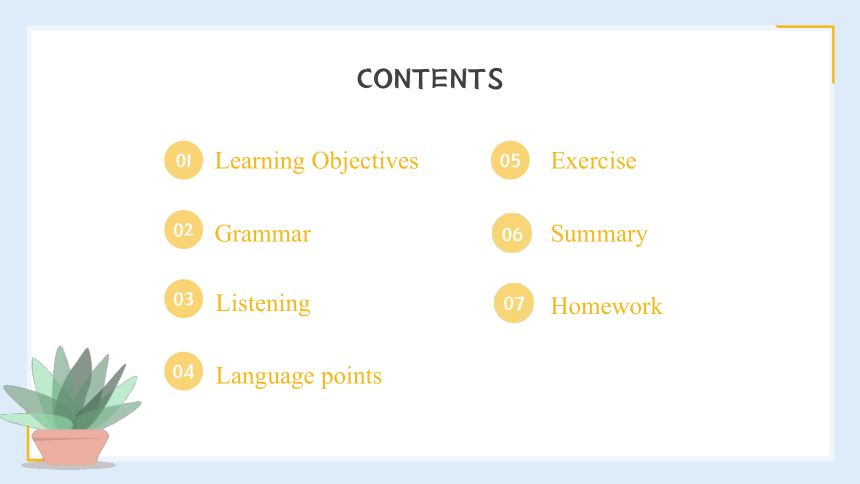
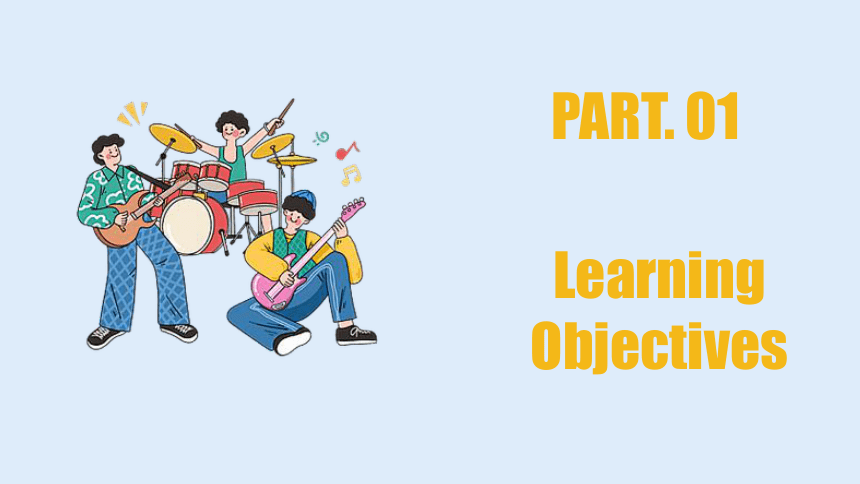
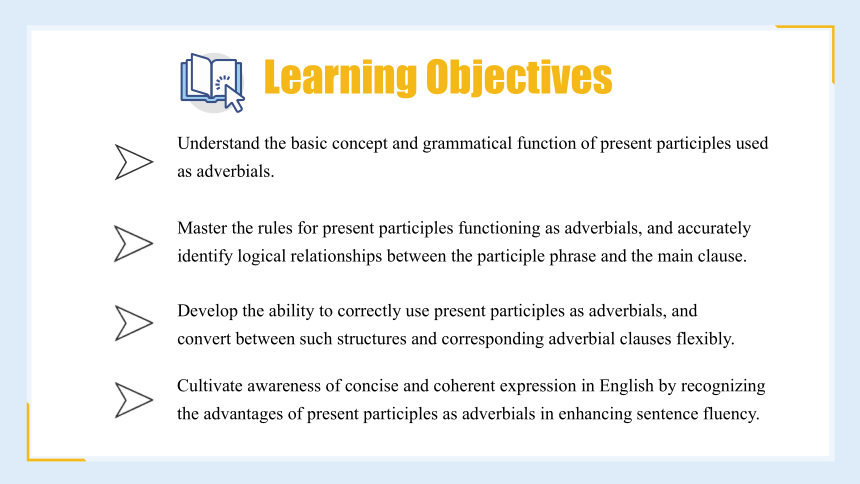
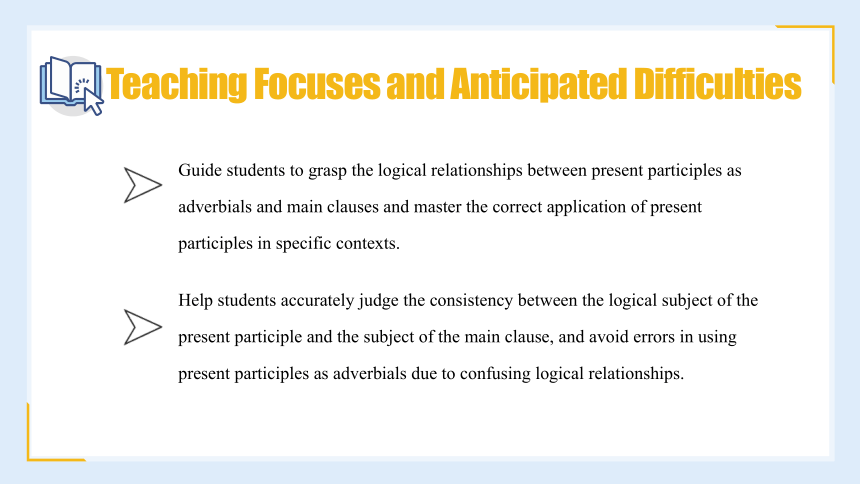
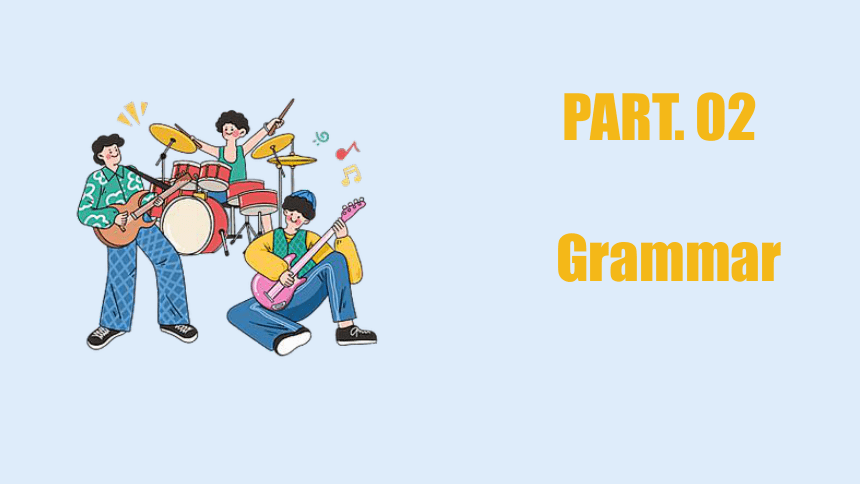
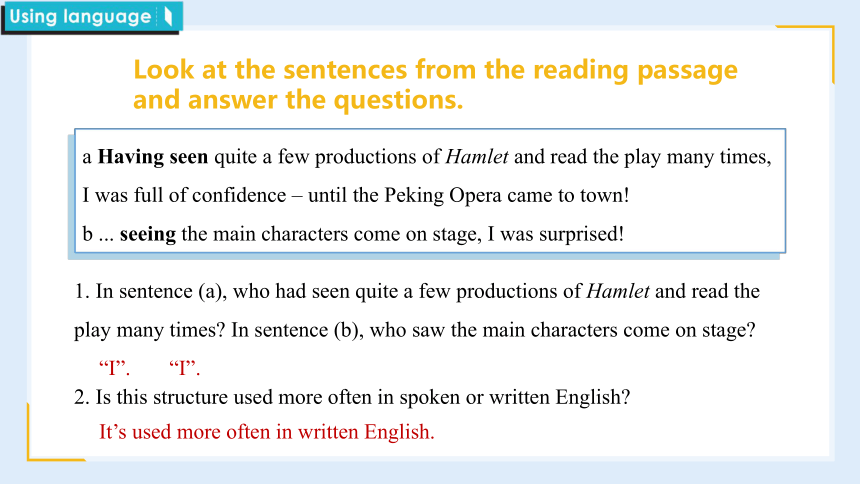
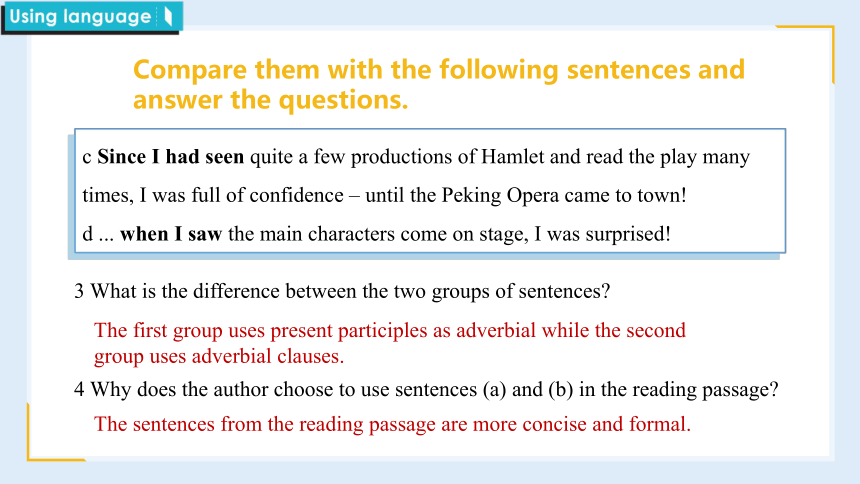
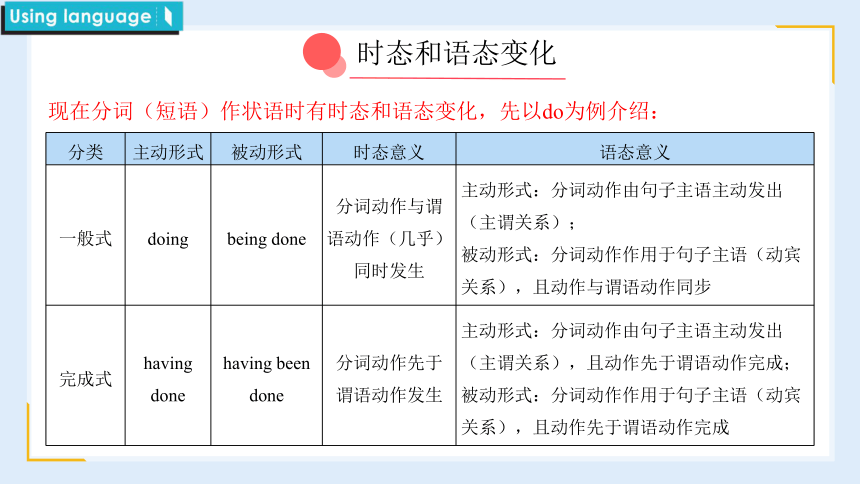
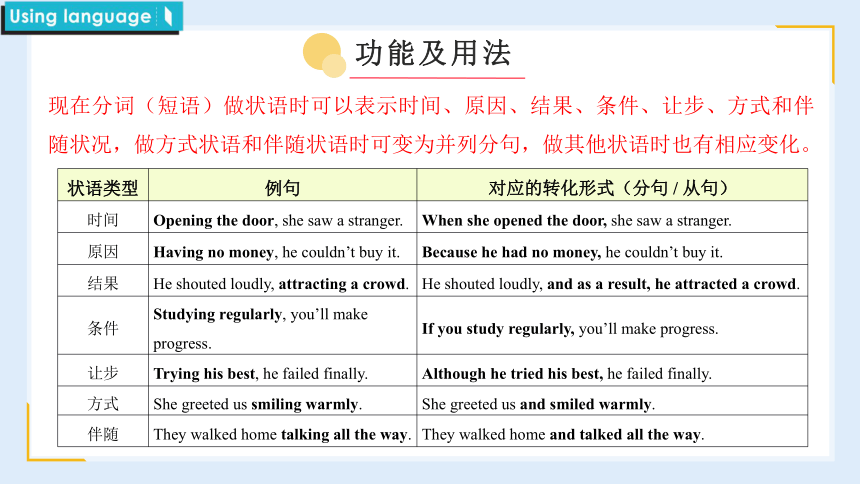
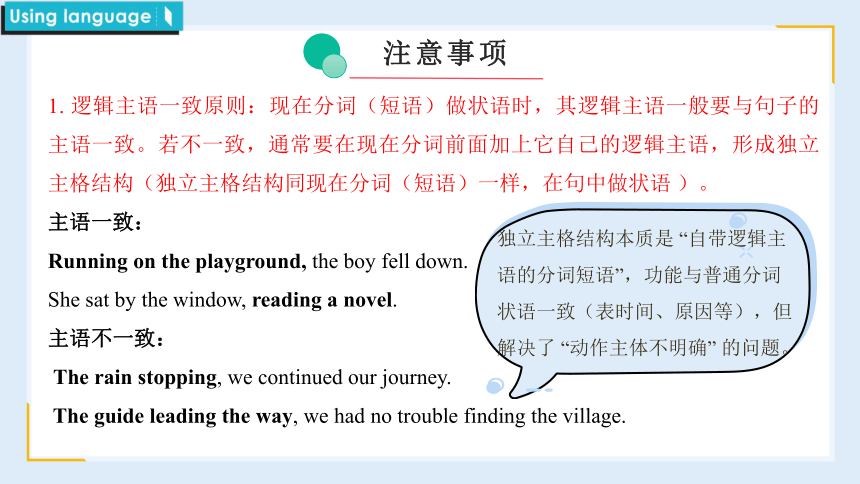
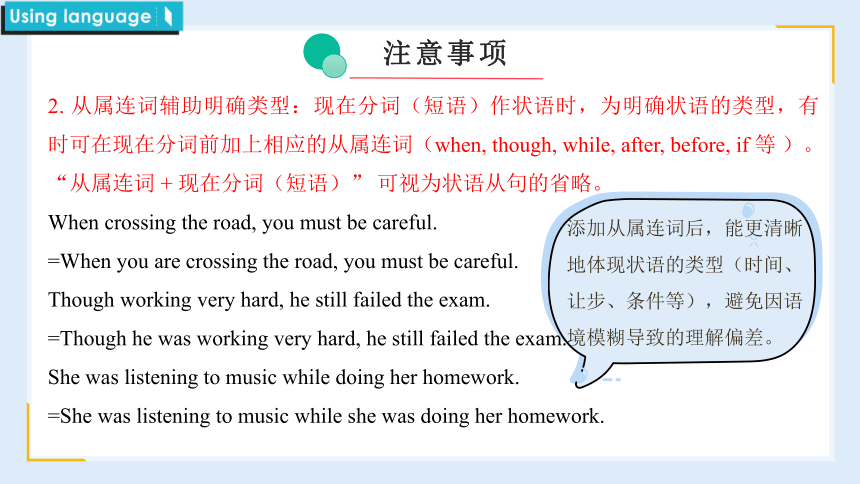
文档简介
(共37张PPT)
Using language
Unit 4
Stage and screen
CONTENTS
01
Grammar
02
03
Exercise
05
Learning Objectives
Listening
06
Summary
07
Homework
04
Language points
Learning Objectives
PART. 01
Learning Objectives
Understand the basic concept and grammatical function of present participles used as adverbials.
Master the rules for present participles functioning as adverbials, and accurately identify logical relationships between the participle phrase and the main clause.
Develop the ability to correctly use present participles as adverbials, and convert between such structures and corresponding adverbial clauses flexibly.
Cultivate awareness of concise and coherent expression in English by recognizing the advantages of present participles as adverbials in enhancing sentence fluency.
Teaching Focuses and Anticipated Difficulties
Guide students to grasp the logical relationships between present participles as adverbials and main clauses and master the correct application of present participles in specific contexts.
Help students accurately judge the consistency between the logical subject of the present participle and the subject of the main clause, and avoid errors in using present participles as adverbials due to confusing logical relationships.
PART. 02
Grammar
a Having seen quite a few productions of Hamlet and read the play many times, I was full of confidence – until the Peking Opera came to town!
b ... seeing the main characters come on stage, I was surprised!
1. In sentence (a), who had seen quite a few productions of Hamlet and read the play many times In sentence (b), who saw the main characters come on stage
“I”.
Look at the sentences from the reading passage and answer the questions.
2. Is this structure used more often in spoken or written English
“I”.
It’s used more often in written English.
Compare them with the following sentences and answer the questions.
c Since I had seen quite a few productions of Hamlet and read the play many times, I was full of confidence – until the Peking Opera came to town!
d ... when I saw the main characters come on stage, I was surprised!
3 What is the difference between the two groups of sentences
4 Why does the author choose to use sentences (a) and (b) in the reading passage
The first group uses present participles as adverbial while the second group uses adverbial clauses.
The sentences from the reading passage are more concise and formal.
时态和语态变化
现在分词(短语)作状语时有时态和语态变化,先以do为例介绍:
分类 主动形式 被动形式 时态意义 语态意义
一般式 doing being done 分词动作与谓语动作(几乎)同时发生 主动形式:分词动作由句子主语主动发出(主谓关系);
被动形式:分词动作作用于句子主语(动宾关系),且动作与谓语动作同步
完成式 having done having been done 分词动作先于谓语动作发生 主动形式:分词动作由句子主语主动发出(主谓关系),且动作先于谓语动作完成;被动形式:分词动作作用于句子主语(动宾关系),且动作先于谓语动作完成
现在分词(短语)做状语时可以表示时间、原因、结果、条件、让步、方式和伴随状况,做方式状语和伴随状语时可变为并列分句,做其他状语时也有相应变化。
功能及用法
状语类型 例句 对应的转化形式(分句 / 从句)
时间 Opening the door, she saw a stranger. When she opened the door, she saw a stranger.
原因 Having no money, he couldn’t buy it. Because he had no money, he couldn’t buy it.
结果 He shouted loudly, attracting a crowd. He shouted loudly, and as a result, he attracted a crowd.
条件 Studying regularly, you’ll make progress. If you study regularly, you’ll make progress.
让步 Trying his best, he failed finally. Although he tried his best, he failed finally.
方式 She greeted us smiling warmly. She greeted us and smiled warmly.
伴随 They walked home talking all the way. They walked home and talked all the way.
1. 逻辑主语一致原则:现在分词(短语)做状语时,其逻辑主语一般要与句子的主语一致。若不一致,通常要在现在分词前面加上它自己的逻辑主语,形成独立主格结构(独立主格结构同现在分词(短语)一样,在句中做状语 )。
主语一致:
Running on the playground, the boy fell down.
She sat by the window, reading a novel.
主语不一致:
The rain stopping, we continued our journey.
The guide leading the way, we had no trouble finding the village.
注意事项
独立主格结构本质是 “自带逻辑主语的分词短语”,功能与普通分词状语一致(表时间、原因等),但解决了 “动作主体不明确” 的问题。
2. 从属连词辅助明确类型:现在分词(短语)作状语时,为明确状语的类型,有时可在现在分词前加上相应的从属连词(when, though, while, after, before, if 等 )。“从属连词 + 现在分词(短语)” 可视为状语从句的省略。
When crossing the road, you must be careful.
=When you are crossing the road, you must be careful.
Though working very hard, he still failed the exam.
=Though he was working very hard, he still failed the exam.
She was listening to music while doing her homework.
=She was listening to music while she was doing her homework.
注意事项
添加从属连词后,能更清晰地体现状语的类型(时间、让步、条件等),避免因语境模糊导致的理解偏差。
3. 一般式与完成式的选用:现在分词(短语)做状语时用一般式还是完成式,取决于分词所表示的动作和谓语动词所表示的动作有无明显先后顺序。
若分词动作发生在谓语动词动作之前,用完成式(having done / having been done );
其他情况(如动作几乎同时发生等 ),用一般式(doing / being done )。
She stood there, waving to us. →一般式
Having finished his homework, he went out to play.→完成式
Being criticized by the teacher, he lowered his head.→一般被动式
Having been invited to the party, she bought a new dress.→完成被动式
注意事项
Complete the journal entry with the correct form of the verbs in brackets.
Seeing
felt
making
to practise/
practising
Feeling
knowing
Rewrite the paragraph using the -ing form.
I went to watch the ballet The Peony Pavilion last night. Having thought ballet was more or less the same everywhere, I was totally unprepared for its unique beauty. As soon as the curtain rose, I was absorbed. Borrowing a lot from Chinese dance and music, the Eastern influence on the ballet was clear. The production was full of colours and romantic symbols, challenging my senses in new ways. Enjoying it so much, I have changed my opinion about ballet. I can’t wait to go again!
I went to watch the ballet The Peony Pavilion last night. Because I thought ballet was more or less the same everywhere, I was totally unprepared for its unique beauty. As soon as the curtain rose, I was absorbed. The performance borrowed a lot from Chinese dance and music, so the Eastern influence on the ballet was clear. The production was full of colours and romantic symbols, and challenged my senses in new ways. I enjoyed it so much that it’s changed my opinion about ballet. I can’t wait to go again!
Look at the pictures and answer the questions.
1 What do you know about these types of TV programme
2 Can you think of some examples of each type
Read and match the descriptions to the types of TV
programme in Activity 4. Underline the words and
expressions describing them.
c
e
d
a
b
f
Work in pairs. Talk about your favourite TV programme using the words and expressions you have learnt.
A: What’s your favourite TV programme
B: My favourite TV programme is... It’s a...
A: Why do you like it
...
Watching a performance
PART. 03
Listening
Listen to the conversation and choose the correct memo.
Listen again and complete the flyer.
Now talk about how Josh makes arrangements. Listen again if necessary.
24
28
London Paddington
£70.40
London Victoria
£30
10: 00 am
10: 30 pm
Work in pairs. Act out the conversation about making arrangements to go to a comedy show.
student A
You want to go to a comedy show this weekend. Tell Student B about the show and make arrangements to go and see it together.
Work in pairs. Act out the conversation about making arrangements to go to a comedy show.
student B
Student A wants to go to a comedy show this weekend. Listen for information about the show and make arrangements to go and see it together. You will need to ask for the following information:
time and place of the show
how to get there
where and when to meet
what to take with you
Work in pairs. Make arrangements to attend a concert in another city.
句子中的单词有弱读/重读发音,重读音用于强调关键语义和节奏。
PART. 04
Language
points
As soon as the curtain rose, I was absorbed.
句意:幕布一升起,我就被吸引了。
absorb vt. 吸引;使全神贯注;理解,掌握;吸收;使并入
be/get absorbed in... 全神贯注于……;被…… 吸引
absorb oneself in... 全神贯注于……;被…… 吸引
be absorbed into... 被…… 同化;被…… 吞并;被并入……
absorbing adj. 十分吸引人的,引人入胜的
1
例题:
The small local company was _________ into a large multinational corporation.
absorbed
The production was full of colours and romantic symbols, and
challenged my senses in new ways.
句意:节目制作充满了各种各样的色彩和浪漫的符号,用一些新的方式挑战了我的感官。
a sense of sight/hearing/smell/taste/touch 视觉 / 听觉 / 嗅觉 / 味觉 / 触觉
a sense of humor/duty/direction/shame 幽默感 / 责任感 / 方向感 / 羞耻感
common sense 常识 in a broad/narrow sense 在广 / 狭义上
in a sense 从某种意义上说 lose one’s sense 昏过去,失去理性
make sense 有意义;合乎情理 make sense of 理解,弄懂
例题:
It took her a while to make _______ of the complex instructions.
2
sense
It’s a wonder they didn’t walk out of the studio.
句意:令人惊奇的是他们竟然没有走出演播室。
(1) n. [U] 惊异,惊奇;[C] 奇迹,奇观,奇事
(It’s) no wonder (that)…… 并不奇怪;…… 不足为奇
It’s a wonder (that)… 莫名其妙的是……,令人惊奇的是……
in wonder 吃惊地
(2) v. 想知道,想弄明白,琢磨;非常惊讶,感到诧异。常见搭配:
wonder about sth. 想知道某事,琢磨某事 wonder + wh-从句 想知道……
I wonder if/whether you… 不知您能否……(表示礼貌地提问或请人做事)
例题:
The children looked at the magician’s tricks in _________.
3
wonder
PART. 05
Exercise
It was e_________ cold last night, and the temperature dropped below zero.
He was so a_______ in reading the novel that he didn't notice the time passing by.
The view from the top of the mountain is a_________ breathtaking.
The Great Pyramid of Giza is one of the seven w________ of the ancient world.
She has a good s______ of smell and can easily tell different flowers apart by their scents.
The audience stood up and a_________ loudly.
xtremely
bsorbed
onders
Exercise: 单词拼写
bsolutely
ense
pplauded
Since I knew she was busy, I didn’t disturb her.
_____________________________________________________________
If you turn left at the crossroads, you’ll see the museum.
_____________________________________________________________
As they worked day and night, they managed to finish the project ahead of time.
_____________________________________________________________
Turning left at the crossroads, you’ll see the museum.
Knowing she was busy, I didn’t disturb her.
Working day and night, they managed to finish the project ahead of time.
Exercise: 句子转换:用现在分词作状语
PART. 06
Summary
Using language
Grammar
Vocabulary
Listening
现在分词作状语
时态和语态变化
注意事项
功能及用法
PART. 07
Homework
1. Summarize the usage of -ing as adverbial;
2. Come up with more sentences containing -ing as adverbial.
Thanks
Using language
Unit 4
Stage and screen
CONTENTS
01
Grammar
02
03
Exercise
05
Learning Objectives
Listening
06
Summary
07
Homework
04
Language points
Learning Objectives
PART. 01
Learning Objectives
Understand the basic concept and grammatical function of present participles used as adverbials.
Master the rules for present participles functioning as adverbials, and accurately identify logical relationships between the participle phrase and the main clause.
Develop the ability to correctly use present participles as adverbials, and convert between such structures and corresponding adverbial clauses flexibly.
Cultivate awareness of concise and coherent expression in English by recognizing the advantages of present participles as adverbials in enhancing sentence fluency.
Teaching Focuses and Anticipated Difficulties
Guide students to grasp the logical relationships between present participles as adverbials and main clauses and master the correct application of present participles in specific contexts.
Help students accurately judge the consistency between the logical subject of the present participle and the subject of the main clause, and avoid errors in using present participles as adverbials due to confusing logical relationships.
PART. 02
Grammar
a Having seen quite a few productions of Hamlet and read the play many times, I was full of confidence – until the Peking Opera came to town!
b ... seeing the main characters come on stage, I was surprised!
1. In sentence (a), who had seen quite a few productions of Hamlet and read the play many times In sentence (b), who saw the main characters come on stage
“I”.
Look at the sentences from the reading passage and answer the questions.
2. Is this structure used more often in spoken or written English
“I”.
It’s used more often in written English.
Compare them with the following sentences and answer the questions.
c Since I had seen quite a few productions of Hamlet and read the play many times, I was full of confidence – until the Peking Opera came to town!
d ... when I saw the main characters come on stage, I was surprised!
3 What is the difference between the two groups of sentences
4 Why does the author choose to use sentences (a) and (b) in the reading passage
The first group uses present participles as adverbial while the second group uses adverbial clauses.
The sentences from the reading passage are more concise and formal.
时态和语态变化
现在分词(短语)作状语时有时态和语态变化,先以do为例介绍:
分类 主动形式 被动形式 时态意义 语态意义
一般式 doing being done 分词动作与谓语动作(几乎)同时发生 主动形式:分词动作由句子主语主动发出(主谓关系);
被动形式:分词动作作用于句子主语(动宾关系),且动作与谓语动作同步
完成式 having done having been done 分词动作先于谓语动作发生 主动形式:分词动作由句子主语主动发出(主谓关系),且动作先于谓语动作完成;被动形式:分词动作作用于句子主语(动宾关系),且动作先于谓语动作完成
现在分词(短语)做状语时可以表示时间、原因、结果、条件、让步、方式和伴随状况,做方式状语和伴随状语时可变为并列分句,做其他状语时也有相应变化。
功能及用法
状语类型 例句 对应的转化形式(分句 / 从句)
时间 Opening the door, she saw a stranger. When she opened the door, she saw a stranger.
原因 Having no money, he couldn’t buy it. Because he had no money, he couldn’t buy it.
结果 He shouted loudly, attracting a crowd. He shouted loudly, and as a result, he attracted a crowd.
条件 Studying regularly, you’ll make progress. If you study regularly, you’ll make progress.
让步 Trying his best, he failed finally. Although he tried his best, he failed finally.
方式 She greeted us smiling warmly. She greeted us and smiled warmly.
伴随 They walked home talking all the way. They walked home and talked all the way.
1. 逻辑主语一致原则:现在分词(短语)做状语时,其逻辑主语一般要与句子的主语一致。若不一致,通常要在现在分词前面加上它自己的逻辑主语,形成独立主格结构(独立主格结构同现在分词(短语)一样,在句中做状语 )。
主语一致:
Running on the playground, the boy fell down.
She sat by the window, reading a novel.
主语不一致:
The rain stopping, we continued our journey.
The guide leading the way, we had no trouble finding the village.
注意事项
独立主格结构本质是 “自带逻辑主语的分词短语”,功能与普通分词状语一致(表时间、原因等),但解决了 “动作主体不明确” 的问题。
2. 从属连词辅助明确类型:现在分词(短语)作状语时,为明确状语的类型,有时可在现在分词前加上相应的从属连词(when, though, while, after, before, if 等 )。“从属连词 + 现在分词(短语)” 可视为状语从句的省略。
When crossing the road, you must be careful.
=When you are crossing the road, you must be careful.
Though working very hard, he still failed the exam.
=Though he was working very hard, he still failed the exam.
She was listening to music while doing her homework.
=She was listening to music while she was doing her homework.
注意事项
添加从属连词后,能更清晰地体现状语的类型(时间、让步、条件等),避免因语境模糊导致的理解偏差。
3. 一般式与完成式的选用:现在分词(短语)做状语时用一般式还是完成式,取决于分词所表示的动作和谓语动词所表示的动作有无明显先后顺序。
若分词动作发生在谓语动词动作之前,用完成式(having done / having been done );
其他情况(如动作几乎同时发生等 ),用一般式(doing / being done )。
She stood there, waving to us. →一般式
Having finished his homework, he went out to play.→完成式
Being criticized by the teacher, he lowered his head.→一般被动式
Having been invited to the party, she bought a new dress.→完成被动式
注意事项
Complete the journal entry with the correct form of the verbs in brackets.
Seeing
felt
making
to practise/
practising
Feeling
knowing
Rewrite the paragraph using the -ing form.
I went to watch the ballet The Peony Pavilion last night. Having thought ballet was more or less the same everywhere, I was totally unprepared for its unique beauty. As soon as the curtain rose, I was absorbed. Borrowing a lot from Chinese dance and music, the Eastern influence on the ballet was clear. The production was full of colours and romantic symbols, challenging my senses in new ways. Enjoying it so much, I have changed my opinion about ballet. I can’t wait to go again!
I went to watch the ballet The Peony Pavilion last night. Because I thought ballet was more or less the same everywhere, I was totally unprepared for its unique beauty. As soon as the curtain rose, I was absorbed. The performance borrowed a lot from Chinese dance and music, so the Eastern influence on the ballet was clear. The production was full of colours and romantic symbols, and challenged my senses in new ways. I enjoyed it so much that it’s changed my opinion about ballet. I can’t wait to go again!
Look at the pictures and answer the questions.
1 What do you know about these types of TV programme
2 Can you think of some examples of each type
Read and match the descriptions to the types of TV
programme in Activity 4. Underline the words and
expressions describing them.
c
e
d
a
b
f
Work in pairs. Talk about your favourite TV programme using the words and expressions you have learnt.
A: What’s your favourite TV programme
B: My favourite TV programme is... It’s a...
A: Why do you like it
...
Watching a performance
PART. 03
Listening
Listen to the conversation and choose the correct memo.
Listen again and complete the flyer.
Now talk about how Josh makes arrangements. Listen again if necessary.
24
28
London Paddington
£70.40
London Victoria
£30
10: 00 am
10: 30 pm
Work in pairs. Act out the conversation about making arrangements to go to a comedy show.
student A
You want to go to a comedy show this weekend. Tell Student B about the show and make arrangements to go and see it together.
Work in pairs. Act out the conversation about making arrangements to go to a comedy show.
student B
Student A wants to go to a comedy show this weekend. Listen for information about the show and make arrangements to go and see it together. You will need to ask for the following information:
time and place of the show
how to get there
where and when to meet
what to take with you
Work in pairs. Make arrangements to attend a concert in another city.
句子中的单词有弱读/重读发音,重读音用于强调关键语义和节奏。
PART. 04
Language
points
As soon as the curtain rose, I was absorbed.
句意:幕布一升起,我就被吸引了。
absorb vt. 吸引;使全神贯注;理解,掌握;吸收;使并入
be/get absorbed in... 全神贯注于……;被…… 吸引
absorb oneself in... 全神贯注于……;被…… 吸引
be absorbed into... 被…… 同化;被…… 吞并;被并入……
absorbing adj. 十分吸引人的,引人入胜的
1
例题:
The small local company was _________ into a large multinational corporation.
absorbed
The production was full of colours and romantic symbols, and
challenged my senses in new ways.
句意:节目制作充满了各种各样的色彩和浪漫的符号,用一些新的方式挑战了我的感官。
a sense of sight/hearing/smell/taste/touch 视觉 / 听觉 / 嗅觉 / 味觉 / 触觉
a sense of humor/duty/direction/shame 幽默感 / 责任感 / 方向感 / 羞耻感
common sense 常识 in a broad/narrow sense 在广 / 狭义上
in a sense 从某种意义上说 lose one’s sense 昏过去,失去理性
make sense 有意义;合乎情理 make sense of 理解,弄懂
例题:
It took her a while to make _______ of the complex instructions.
2
sense
It’s a wonder they didn’t walk out of the studio.
句意:令人惊奇的是他们竟然没有走出演播室。
(1) n. [U] 惊异,惊奇;[C] 奇迹,奇观,奇事
(It’s) no wonder (that)…… 并不奇怪;…… 不足为奇
It’s a wonder (that)… 莫名其妙的是……,令人惊奇的是……
in wonder 吃惊地
(2) v. 想知道,想弄明白,琢磨;非常惊讶,感到诧异。常见搭配:
wonder about sth. 想知道某事,琢磨某事 wonder + wh-从句 想知道……
I wonder if/whether you… 不知您能否……(表示礼貌地提问或请人做事)
例题:
The children looked at the magician’s tricks in _________.
3
wonder
PART. 05
Exercise
It was e_________ cold last night, and the temperature dropped below zero.
He was so a_______ in reading the novel that he didn't notice the time passing by.
The view from the top of the mountain is a_________ breathtaking.
The Great Pyramid of Giza is one of the seven w________ of the ancient world.
She has a good s______ of smell and can easily tell different flowers apart by their scents.
The audience stood up and a_________ loudly.
xtremely
bsorbed
onders
Exercise: 单词拼写
bsolutely
ense
pplauded
Since I knew she was busy, I didn’t disturb her.
_____________________________________________________________
If you turn left at the crossroads, you’ll see the museum.
_____________________________________________________________
As they worked day and night, they managed to finish the project ahead of time.
_____________________________________________________________
Turning left at the crossroads, you’ll see the museum.
Knowing she was busy, I didn’t disturb her.
Working day and night, they managed to finish the project ahead of time.
Exercise: 句子转换:用现在分词作状语
PART. 06
Summary
Using language
Grammar
Vocabulary
Listening
现在分词作状语
时态和语态变化
注意事项
功能及用法
PART. 07
Homework
1. Summarize the usage of -ing as adverbial;
2. Come up with more sentences containing -ing as adverbial.
Thanks
